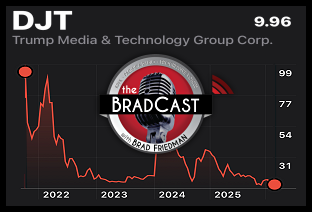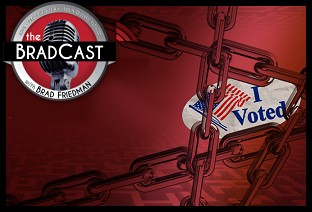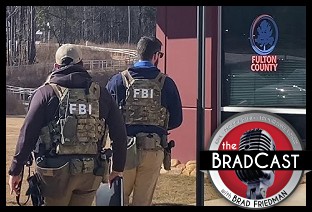By John Gideon, www.VotersUnite.Org and www.VoteTrustUSA.Org May 15, 2006

 Yes, the wheels are wobbling on the locomotives. The vendors --- ES&S, Diebold, and the rest --- attempt to keep a stiff upper lip as they both fail to perform, yet continue collecting tax-payer dollars from the county election coffers. Meanwhile some elections officials have just turned a blind-eye to what is happening while they continue to make excuses for their vendors: The private corporate American Electronic Voting Machine behemoths that are being paid to take over America's Public Electoral system.
Yes, the wheels are wobbling on the locomotives. The vendors --- ES&S, Diebold, and the rest --- attempt to keep a stiff upper lip as they both fail to perform, yet continue collecting tax-payer dollars from the county election coffers. Meanwhile some elections officials have just turned a blind-eye to what is happening while they continue to make excuses for their vendors: The private corporate American Electronic Voting Machine behemoths that are being paid to take over America's Public Electoral system.
And the Election Assistance Commission (EAC) which was put in place by the Help America Vote Act (HAVA), theoretically, to keep all of this from occurring? Well, all they do is raise their hands and shrug and tell anyone who asks, that they don't do voting systems certification so they just don't know anything. The Sergeant Schultz Defense, perhaps?
And the corporate media? It took the announcement of a huge security chasm with the Diebold TS and TSx touch-screen machines for them to finally wake up and realize the voters in our country may like to hear a bit about what is happening with their elections. Of course, each media outlet spins it in their own way. The Wall Street Journal, reported on the Diebold issue with little or nothing from the computer scientists while overloading their article with plenty of misinformation from Diebold and their showcase state of Maryland. The New York Times did a good job of reporting both sides. The Rev. Moon's United Press International joined the WSJ in mis-reporting and giving their pro-corporate, pro-electronic bias spin. But, hey! The media has woken up a little. Let's hope they will now sit up and take notice and not go back into hibernation.
This next Tuesday we have three more states holding primary elections. Oregon, Kentucky and Pennsylvania are the next locomotives on the tracks. Pennsylvania is of special concern because of the number of ES&S and Diebold counties and the fact that this is the first election to be held on new electronic voting machines in almost every county.
Diebold's Perfect Storm
This week was the week for the long-awaited revelation of a hole in Diebold's Direct Recording Machine's (DRE) security. This hole in security is comparable to the size of the eye in the "Perfect Storm". Initial information about this security problem was discussed in last week's "Train Wreck" and was reported prior to that by The BRAD BLOG.
On Thursday, BlackBoxVoting.Org who organized the inspections of Diebold TSx DREs in Emery County, Utah, released a lightly-redacted report, for security reasons, of Finnish Computer Scientist Harri Hursti's revelations from the examination. An un-redacted copy of this report was sent to many federal and state officials in hope they will take the steps necessary to close this gaping security hole.
It must be stated that none of this crucial information would be available to America without the assistance and integrity of Bruce Funk, who, as the Emery County Clerk, noticed a problem with the Diebold TSx voting machines that were delivered to him. He contacted BlackBoxVoting.Org who brought Harri Hursti over from Finland to inspect the machines along with computer security specialists from Security Innovations. If Bruce Funk had not cared so much about the voters in his county, and ultimately in the whole country, this security hole ? which Diebold has admitted to building into their machines purposely to make it easier to update software --- would have gone unnoticed publicly for who knows how long. Unfortunately Mr. Funk must now fight to get his job back because Diebold lashed out against him and the state and county took their side and turned their back on Mr. Funk.
What is the reaction to this from Diebold and from some of the states? David Bear, a spokesman for the company says:
Meanwhile, Deborah Hench, San Joaquin County California Registrar of Voters and ardent Diebold supporter says:
Maryland Elections Administrator, Linda Lamone, an even more ardent Diebold supporter had this to say:
From Utah we have Joe Demma, Chief of Staff in the Lieutenant Governor's Office who supports Diebold and has apparently supported removing the 23-year elected Bruce Funk from his job says:
All except Funk who found the problems in the first place, I presume?
And from Mark Radke, another Diebold 'talking-head' official and apologist who's been singing the same tired song for years as he's been pushing his company's faulty wares:
The lack of concern by these State Officials and Diebold Officials (the differences between the two are often very slight if any) and their attempts to minimize the situation stand in marked contrast to the comments of computer scientists across the country.
Michael I. Shamos, a professor of computer science at Carnegie Mellon University who is an examiner of electronic voting systems for Pennsylvania said:
Douglas W. Jones, a professor of computer science at the University of Iowa says:
Avi Rubin, a Johns Hopkins University computer science professor had this to say:
And what of the questions that should be asked? Diebold has known about this huge hole in their security since they installed it. Why are they now claiming it was just discovered?
And why has the Election Assistance Commission had nothing to say about this security issue?
Hopefully these questions and more will be answered in the coming weeks and hopefully the corporate media will stick around for awhile and do their jobs. There is plenty of room for them.
Another Primary Election Failure For ES&S ? West Virginia
This past Tuesday gave us two state primaries ? Nebraska and West Virginia. While Nebraska seemed to have a quiet and fairly problem free primary election West Virginia's was anything but error free or quiet. The same locomotive that steamrolled through Indiana and left destruction in it's wake showed-up in West Virginia during early voting and continued through canvassing.
As we reported in last week's "Train Wreck" Election Systems & Software (ES&S) has failed to provide voting machines, ballot programming or paper ballots to many of West Virginia's counties to support early voting. The primary was no better. A short list gives us just a few of the problems that have affected the voters in numerous counties:
Last week we reported that Kanawha County Commissioner Kent Carper had filed a formal complaint with the Secretary of State's office after ES&S failed to appear at public testing for the machines. ES&S agreed to a request from Kanawha County elections officials that ES&S have a technician present during the final count of all votes. However, even with the knowledge that the county had previously filed a formal complaint ES&S pulled their technician after only a couple hours. When the technician left the system went down for a few hours until elections officials could find a solution themselves.
With all of the knowledge of failures on the part of ES&S, Secretary of State Betty Ireland filed a formal complaint with the Election Assistance Commission on Wednesday. As reported by The State Journal Secretary Ireland had this to say:
"And, Ireland says, now that the election is over, strategy talks about the problems with Election Systems and Software will begin...but, "We will not and cannot discuss publicly our legal strategy. As before, we continue to work with the Attorney General's Office to address our options".
"The state's selection committee chose ES&S because of its past service in the state and it's knowledge of West Virginia election deadlines and procedures. Ireland says, "Unfortunately, we now feel ES&S let West Virginia down"."
So much like their failure in Indiana, Oregon, California, and Arkansas ES&S has let down the voters of the state of West Virginia.
ES&S Re-Writes Their Contract With Tennessee But Forgets To Tell The State
Just this past Saturday the Tennessean reported that ES&S had decided that their contract with the state of Tennessee did not suit their plans so they changed the contract form language and added, without permission, "used equipment" language to their order form.
This means that counties in the state will now get iVotronic Direct Recording Electronic (DRE) voting machines that are being used in the Pennsylvania primary on Tuesday. This way ES&S can move these machines from one state to another like filling a hole by digging another hole. You never get rid of the hole.
The state has apparently decided that they will use this breach as a bargaining chip for a better price for maintenance and other fees that they can expect to pay for the whole life of the voting machines or until ES&S decides to walk-out on their contracts.
While the state may see a chance to get something from this unethical act by ES&S some of the counties are not too happy with the situation.
""These people have been playing games with us," he said."I'm not for having any used equipment.""
The Arkansas Mess Gets No Better
While ES&S seems to be gaining in Arkansas supporting their early voting it seems that every step forward they make; they take another step back. According to WPTY-TV24 while Pulaski County got the software for their ES&S iVotronics (four days late) St. Francis County got their ballots. That sounds great except that they received 75 different styles of ballots from ES&S but they only ordered 18 different ballot styles.
KAIT ? TV8 reports that many counties that were forced by ES&S to use paper ballots ran out of those ballots on Monday and Tuesday. The reporter called ES&S and spoke with an official at their printer in Omaha, Nebraska. The official claimed to know nothing about any ballot shortages. However, Craighead County Commissioners say that they have spoken many times with ES&S representatives about the ballot shortage.
Florida Counties Receive Uncertified Diebold DREs
On Friday The Daytona Beach News Journal reported that officials in Volusia County discovered that the 210 upgraded Diebold TSx DREs that they had just taken custody looked a bit different than the other DREs they had on-hand. These new machines are 'Model D' which are not yet certified for use by the state. And Volusia is only one of five counties who have these machines.
The News Journal reports:
Thirty of Florida's 67 counties use Diebold voting equipment, but only five, including Volusia, got the uncertified models, said Ann McFall, Volusia County supervisor of elections.
"I think it's an embarrassment to Diebold and the Division (of Elections)," McFall said. "I'm happy my department caught this. No other county caught this."
Of course the state is circling-the-wagons of support for Diebold. The Orlando Sentinel reports:
""It's just a modification," Nash said. She compared it to a routine software update on a home computer. "It's very similar to that.""
And:
"Still, he listed several changes with the hardware and operating system. The changes include a new liquid-crystal display, a new "inverter" to power the LCD and changes to the motherboard to accommodate a "graphics processor, flash memory, and voltage regulators. The motherboard also includes the addition of fuses to the modem outputs to improve immunity to phone line faults," he wrote.
"The operating system is also "slightly different," Drury wrote. The "firmware" has not changed, he said in the e-mail."
Excuse me? It's the same except that it has had many changes? Now here are two locomotives running directly at each other and this in a state where the legislature cares enough about elections that they have ignored any plea for a VVPAT and made any audit illegal.
So that was the week that was. More revelations. More problems. More investigations. More voters who really don't know if their vote was counted as it was cast. More elections officials and poll workers who have had to work long hours just to clean up what mess the vendors have left them. Meanwhile, more money in the vendor's coffers and more opportunity for them to obfuscate and misinform the media. Maybe it will get better? Only the voters hope so.


 No Way Home: Trump's Iran War a Spreading, Chaotic, Deadly, Disaster: 'BradCast' 3/3/26
No Way Home: Trump's Iran War a Spreading, Chaotic, Deadly, Disaster: 'BradCast' 3/3/26 'Green News Report' 3/3/26
'Green News Report' 3/3/26
 Trump Attacks Iran in 'Operation Epstein Fury': 'BradCast' 3/2/26
Trump Attacks Iran in 'Operation Epstein Fury': 'BradCast' 3/2/26 Sunday 'No, More Wars!' Toons
Sunday 'No, More Wars!' Toons Loser Trump's Unlawful Tariffs, Failed Media Company, Corrupt SCOTUS: 'BradCast' 2/26/26
Loser Trump's Unlawful Tariffs, Failed Media Company, Corrupt SCOTUS: 'BradCast' 2/26/26 'Green News Report' 2/26/26
'Green News Report' 2/26/26 The State of the Union is ... Insane.
The State of the Union is ... Insane. FCC's New 'Threat' to Broadcasters; NPR Confirms DOJ's 'Missing' Trump 'Rape' Docs: 'BradCast' 2/24/26
FCC's New 'Threat' to Broadcasters; NPR Confirms DOJ's 'Missing' Trump 'Rape' Docs: 'BradCast' 2/24/26 'Green News Report' 2/24/26
'Green News Report' 2/24/26 Aileen Cannon May be Covering Up Evidence of Trump Rape: 'BradCast' 2/23/26
Aileen Cannon May be Covering Up Evidence of Trump Rape: 'BradCast' 2/23/26 Sunday 'Plan B' Toons
Sunday 'Plan B' Toons 'Green News Report' 2/19/26
'Green News Report' 2/19/26 DOJ Hiding Evidence of Trump Rape, Assault Allegations: 'BradCast' 2/19/26
DOJ Hiding Evidence of Trump Rape, Assault Allegations: 'BradCast' 2/19/26 'No More Fig Leaves': Antisemitism Rising Inside MAGA, GOP: 'BradCast' 2/18/26
'No More Fig Leaves': Antisemitism Rising Inside MAGA, GOP: 'BradCast' 2/18/26 'SAVE America Act' Designed to Save GOP, Undermine Democracy: 'BradCast' 2/17/26
'SAVE America Act' Designed to Save GOP, Undermine Democracy: 'BradCast' 2/17/26 Court Blocks Hegseth Censure of Sen. Kelly
Court Blocks Hegseth Censure of Sen. Kelly Harpy Tantrums, Legal Losses, Election Fails, Retreating ICE: 'BradCast' 2/12/26
Harpy Tantrums, Legal Losses, Election Fails, Retreating ICE: 'BradCast' 2/12/26 Trump to Reverse EPA's Landmark 'Endanger-ment Finding': 'BradCast' 2/11/26
Trump to Reverse EPA's Landmark 'Endanger-ment Finding': 'BradCast' 2/11/26 Trump's Racism, Corruption, 'Culture War': 'BradCast' 2/10/26
Trump's Racism, Corruption, 'Culture War': 'BradCast' 2/10/26 About Trump's FBI Raid of Fulton County, GA Election Hub: 'BradCast' 2/9/26
About Trump's FBI Raid of Fulton County, GA Election Hub: 'BradCast' 2/9/26
 VA GOP VOTER REG FRAUDSTER OFF HOOK
VA GOP VOTER REG FRAUDSTER OFF HOOK Criminal GOP Voter Registration Fraud Probe Expanding in VA
Criminal GOP Voter Registration Fraud Probe Expanding in VA DOJ PROBE SOUGHT AFTER VA ARREST
DOJ PROBE SOUGHT AFTER VA ARREST Arrest in VA: GOP Voter Reg Scandal Widens
Arrest in VA: GOP Voter Reg Scandal Widens ALL TOGETHER: ROVE, SPROUL, KOCHS, RNC
ALL TOGETHER: ROVE, SPROUL, KOCHS, RNC LATimes: RNC's 'Fired' Sproul Working for Repubs in 'as Many as 30 States'
LATimes: RNC's 'Fired' Sproul Working for Repubs in 'as Many as 30 States' 'Fired' Sproul Group 'Cloned', Still Working for Republicans in At Least 10 States
'Fired' Sproul Group 'Cloned', Still Working for Republicans in At Least 10 States FINALLY: FOX ON GOP REG FRAUD SCANDAL
FINALLY: FOX ON GOP REG FRAUD SCANDAL COLORADO FOLLOWS FLORIDA WITH GOP CRIMINAL INVESTIGATION
COLORADO FOLLOWS FLORIDA WITH GOP CRIMINAL INVESTIGATION CRIMINAL PROBE LAUNCHED INTO GOP VOTER REGISTRATION FRAUD SCANDAL IN FL
CRIMINAL PROBE LAUNCHED INTO GOP VOTER REGISTRATION FRAUD SCANDAL IN FL Brad Breaks PA Photo ID & GOP Registration Fraud Scandal News on Hartmann TV
Brad Breaks PA Photo ID & GOP Registration Fraud Scandal News on Hartmann TV  CAUGHT ON TAPE: COORDINATED NATIONWIDE GOP VOTER REG SCAM
CAUGHT ON TAPE: COORDINATED NATIONWIDE GOP VOTER REG SCAM CRIMINAL ELECTION FRAUD COMPLAINT FILED AGAINST GOP 'FRAUD' FIRM
CRIMINAL ELECTION FRAUD COMPLAINT FILED AGAINST GOP 'FRAUD' FIRM RICK SCOTT GETS ROLLED IN GOP REGISTRATION FRAUD SCANDAL
RICK SCOTT GETS ROLLED IN GOP REGISTRATION FRAUD SCANDAL VIDEO: Brad Breaks GOP Reg Fraud Scandal on Hartmann TV
VIDEO: Brad Breaks GOP Reg Fraud Scandal on Hartmann TV RNC FIRES NATIONAL VOTER REGISTRATION FIRM FOR FRAUD
RNC FIRES NATIONAL VOTER REGISTRATION FIRM FOR FRAUD EXCLUSIVE: Intvw w/ FL Official Who First Discovered GOP Reg Fraud
EXCLUSIVE: Intvw w/ FL Official Who First Discovered GOP Reg Fraud GOP REGISTRATION FRAUD FOUND IN FL
GOP REGISTRATION FRAUD FOUND IN FL

































